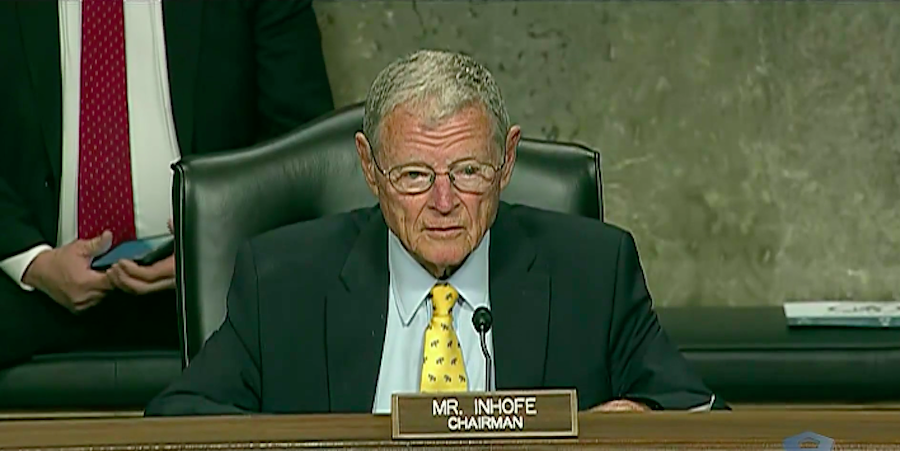SASC aide: “The acquisition piece was never formally transmitted to the Congress.”
WASHINGTON — The Senate Armed Services Committee approved its version of the Fiscal Year 2021 National Defense Authorization Act by a vote of 25-2 following three days of closed hearings, the committee announced June 11.
The markup authorizes $740.5 billion for national defense spending. SASC Chairman Jim Inhofe (R-Okla.) and Ranking Member Jack Reed (D-R.I.) hailed the bill as a show of strong bipartisan support.
A summary of the bill released by the committee includes several items related to the U.S. Space Force and space programs. Notably absent from the bill are provisions on Space Force acquisition reforms that the committee in the 2020 NDAA asked Air Force Secretary Barbara Barrett to submit.
“The acquisition piece was never formally transmitted to the Congress,” a committee aide told reporters on a conference call. “There was a draft version but it was never formally transmitted. So we didn’t act on that at this time.”
Space Force leaders in recent weeks said acquisition reforms are a top priority for the new service. Congress in the 2020 National Defense Authorization Act directed Barrett to propose alternative acquisition processes to help speed up the development and lower the cost of space systems.
A report titled “Alternative Acquisition System for the United States Space Force” was sent to congressional committees on May 20 but the Air Force notified them the next day that what they had received was not the final version.
SASC aides on the June 11 call with reporters did not comment on why the final report had not been submitted.
Conceivably the acquisition proposal or other late items could be addressed on the Senate floor or in a House-Senate conference, one aide said. “There’s no prejudice in this. We just didn’t get the stuff on time.”
Space National Guard
The SASC bill directs the establishment of a Space Force reserve component, but delays the establishment of a Space National Guard until a study on the issue is completed.
A committee aide told reporters that DoD has yet to provide a detailed analysis on the future role of the National Guard in support of the Space Force.
The aide pointed out that Congress and the president created the Space Force “but all the details rest with the department.” The 2020 NDAA asked for a report on the possible role of a Space National Guard. “That report was not received at the time we started this markup,” the aide said. “Whether there’s a guard or not, we’d like to first see that report and the recommendations so we can present that to members.”
National Security Space Launch
The SASC backs the Air Force’s plan for the National Security Space Launch program’s upcoming procurement of launch services known as Phase 2. The bill also requires the Secretary of the Air Force to “develop technologies and systems to enhance Phase 3 NSSL requirements.”
The language on Phase 3 appears to be in response to criticism that the Phase 2 plan to select two launch providers could push the losing companies out of the national security launch market.
The bill expresses support for the development of space technology, including launch vehicles and responsive launch. In a nod to SpaceX, the bill “recognizes the maturity of reusable launch.”
SASC also authorizes increased funding for space domain awareness, launch development and space-based surveillance capability
Space Force, Space Command
- The markup directs the chairman of the Joint Chiefs of Staff and service chiefs to identify space-related missions and expertise that should remain within each service.
- Authorizes voluntary transfer of personnel to the Space Force.
- Prohibits transfer of military installations to the Space Force prior to analysis reviewed by Congress.
- Directs Space Force to work with research institutions to establish critical infrastructure and develop the future workforce.
- Encourages establishment of a space training and readiness command utilizing existing infrastructure.
- Directs the Secretary of the Air Force to provide a report on the selection process and criteria used to determine the permanent site for U.S. Space Command headquarters.
Language against FCC’s Ligado order
- The SASC bill criticizes the Federal Communications Commission’s “misguided decision to approve Ligado Networks’ request for bandwidth for a terrestrial-based cellular network, that put critical GPS signals at risk.”
- The committee prohibits the use of DoD funds to comply with the FCC order on Ligado until the Secretary of Defense submits an estimate of the costs associated with the resulting GPS interference.
- The bill directs the Secretary of Defense to commission an independent study from the National Academies of Science and Engineering on Ligado’s and DoD’s approaches to testing.
